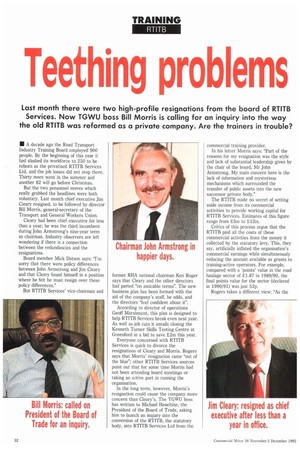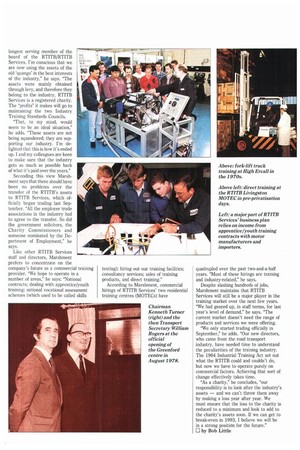Teething problems
Page 34

Page 35

If you've noticed an error in this article please click here to report it so we can fix it.
• A decade ago the Road Transport Industry Training Board employed 900 people. By the beginning of this year it had slashed its workforce to 250 to be reborn as the privatised RTITB Services Ltd, and the job losses did not stop there. Thirty more went in the summer and another 82 will go before Christmas.
But the two personnel moves which really grabbed the headlines were both voluntary. Last month chief executive Jim Cleary resigned, to be followed by director Bill Morris, general-secretary of the Transport and General Workers Union.
Cleary had been chief executive for less than a year; he was the third incumbent during John Armstrong's nine-year term as chairman. Industry observers are left wondering if there is a connection between the redundancies and the resignations.
Board member Mick Datson says: "I'm sorry that there were policy differences between John Armstrong and Jim Cleary and that Cleary found himself in a position where he felt he must resign over these policy differences."
But RTITB Services' vice-chairman and former RHA national chairman Ken Roger says that Cleary and the other directors had parted "on amicable terms". The new business plan has been formed with the aid of the company's staff, he adds, and the directors "feel confident about it".
According to director of operations Geoff Marshment, this plan is designed to help RTITB Services break even next year. As well as job cuts it entails closing the Kenneth Turner Skills Testing Centre at Greenford in a bid to save £2m this year.
Everyone concerned with RTITB Services is quick to divorce the resignations of Cleary and Morris. Rogers says that Morris' resignation came "out of the blue"; other RTITB Services sources point out that for some time Morris had not been attending board meetings or taking an active part in running the organisation.
In the long term, however, Morris's resignation could cause the company more concern than Cleary's. The TGWU boss has written to Michael Heseltine, the President of the Board of Trade, asking him to launch an inquiry into the conversion of the RTITB, the statutory body, into RTITB Services Ltd from the commercial training provider.
In his letter Morris says: "Part of the reasons for my resignation was the style and lack of substantial leadership given by the chair of the board, Mr John Armstrong. My main concern here is the lack of information and mysterious mechanisms which surrounded the transfer of public assets into the new successor private body."
The RTITB made no secret of setting aside income from its commercial activities to provide working capital for RTITB Services. Estimates of this figure range from £5m to £12m.
Critics of this process argue that the RTITB paid all the costs of these commercial activities from the money it collected by the statutory levy. This, they say, artificially inflated the organisation's commercial earnings while simultaneously reducing the amount available as grants to training-active operators. For example, compared with a 'points' value in the road haulage sector of £1.87 in 1989/90, the final points value for the sector (declared in 1990/91) was just 52p.
Rogers takes a different view: "As the longest serving member of the board of the RTITB/RTITB Services, I'm conscious that we are now using the assets of the old 'quango' in the best interests of the industry," he says. The assets were mainly obtained through levy, and therefore they belong to the industry. RTITB Services is a registered charity. The "profits" it makes will go to maintaining the two Industry Training Standards Councils.
"That, to my mind, would seem to he an ideal situation," he adds. "These assets are not being squandered; they are supporting our industry. I'm delighted that this is how it's ended up. I and my colleagues are keen to make sure that the industry gets as much as possible back of what it's paid over the years."
Seconding this view Marshment says that there should have been no problems over the transfer of the RTITB's assets to RTITB Services, which officially began trading last September. "All the employer trade associations in the industry had to agree to the transfer. So did the government solicitors, the Charity Commissioners and someone nominated by the Department of Employment," he says.
Like other RTITB Services staff and directors, Marshment prefers to concentrate on the company's future as a commercial training provider. "We hope to operate in a number of areas," he says: "National contracts; dealing with apprentice/youth training; national vocational assessment schemes (which used to be called skills testing); hiring out our training facilities; consultancy services; sales of training products, and direct training."
According to Marshment, commercial 'firings of RTITB Services' two residential training centres (MOTECs) have quadrupled over the past two-and-a-half years. "Most of these hirings are training and industry-related," he says.
Despite slashing hundreds of jobs, Marshment maintains that RTITB Services will still be a major player in the training market over the next few years. "We had geared up, in staff terms, for last year's level of demand," he says. "The current market doesn't need the range of products and services we were offering.
"We only started trading officially in September," he adds. "Our new directors, who came from the road transport industry, have needed time to understand the peculiarities of the training industry. The 1964 Industrial Training Act set out what the RTITB could and couldn't do, but now we have to operate purely on commercial factors, Achieving that sort of change effectively takes time,
"As a charity," he concludes, "our responsibility is to look after the industry's assets — and we can't throw them away by making a loss year after year. We must ensure that the loss to the charity is reduced to a minimum and look to add to the charity's assets soon. If we can get to break-even in 1993, I believe we will be in a strong positiOn for the future." El by Bob Little












































































